Pets come in all shapes and sizes. From a tiny sand dollar turtle in a tank to a hulking English Mastiff, adding a pet to your family requires time, patience, and research to ensure that you can offer them proper care and shelter. While the different types of pets might vary by household, there are a few care tips that can be applied to virtually any pet to ensure that you are ready to welcome your new furry, scaly, or slimy friend into your home.
Know their dietary needs.
Not every animal eats Kibble. Some of the more exotic animals require a little more attention to detail in order to keep them happy and healthy. For example, guinea pigs actually need to eat a fair amount of fresh produce every day, making them less of a “starter pet” than many of the mainstream pet stores advertise.
It’s important to know what you’re getting into and whether or not you feel comfortable with your animal’s dietary needs. You might be vegan — and that’s awesome — but it doesn’t mean that your pets can eat a plant-based diet. Some pets require food that might not be for the squeamish.
Gargoyle geckos are a great example of this. These geckos are cute and make amazing pets, but you need to be comfortable handling and purchasing mealworms, wax worms, and even roaches in order to provide a balanced diet for a gargoyle gecko. If bugs don’t creep you out, that’s great. Just make sure you’re purchasing gecko food from a real food provider. Catching your own crickets might be fun, but you don’t know if that wild cricket has come into contact with insecticide or other harmful chemicals in the outside world. Reptiles deserve great and healthy food, too!
Envision your new lifestyle.
You probably already have an established schedule. Introducing a pet, even one that lives in an enclosure like a gecko or another reptile does most of the time is going to shake up your routine. Don’t just take day-to-day activities into consideration. Make sure you’re planning ahead for other yearly occurrences, like trips.
Are you able to bring your pet gecko with you? Will you be boarding your pet? How much will you need to pay someone to watch your pet while you’re away? Do you know someone who will feel comfortable feeding your pet lizard the various insects it requires? Considering your pet’s stress level’s very important. They have thoughts and feelings too. Forcing them into a travel situation isn’t always going to work.
If you’re lucky enough to have a pet that can travel with you for holidays and vacations, make sure you set yourself up for success and safety. Dogs should be traveling with a harness and seat belt. Joyride Harness has some of the best products for your pooch on the market. They’ll make sure your dog gets to and from your destination comfortably and securely in the car or plane. Also, look into dog parks or other amenities wherever you’re going and make sure you bring a harness and leash with you so that you can walk your pup when you’re away. If you have a gecko or another lizard, make sure you’ve bought enough food for your reptile ahead of time so that the gecko-sitter doesn’t need to worry about it. Talk to your vet about how to keep small animals safe during trips. Every life, even the smallest ones, count.
Find your vet beforehand.
Not all vets specialize in the same kind of animals. If you have an exotic pet — hamsters and hedgehogs are considered exotic, as are all reptiles — make sure your vet has more than a rudimentary knowledge on how to care for your pet should something happen. Explore your options. Be flexible. If you decide on a vet and then your pet doesn’t respond well to that person, find someone else.
Think about allergens.
You should never commit to a pet that you won’t be able to care for due to allergies in your family. If anyone, even an extended relative who comes over often, is allergic, you might need to refrain from a furry pet. Although that might be disappointing now, it opens up a whole window of opportunities. Have you ever thought about owning fire-bellied toads or gargoyle geckos? They’re fascinating creatures and make great pets! Look on the bright side and find a pet that works for everyone.
Consider your budget.
You might have a lot of love to give to a pet, but money is a pivotal factor in the care and up keeping of your animal. Before stepping foot in an adoption center, add up what expenses you’ll have monthly for the animal. How about yearly? Vet bills are expensive. As much as you might not want to think about your fur baby or lizard pal getting sick, it’s best to plan financially for those situations. Be honest about whether you can be a responsible pet parent, and wait if you’re not going to be able to financially support your animal.
Ensure everyone has “elbow room.”
Even if you’ve always dreamed of having a Bernese mountain dog, if you live in a studio apartment in New York, it might not be the time to implement that desire. Are you providing the best quality of life for your pet in terms of space? Think ahead and put yourself in their paws.




